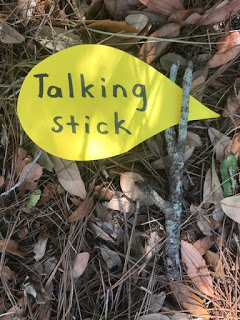After a year of screens, I hope you are all able to get outside now with your children. We know that children need play and movement and nature more than they need worksheets now, so here are some activities where they can learn as they have FUN!
Reading Tree
Choose a poetry book, storybook, and non-fiction book to read outside under a shady tree. Can the children identify the books?
Reading Buddies
Divide children into pairs and let them each choose a favorite book. Go out on the playground, find a shady spot, and enjoy sharing their books with each other. *Encourage them to ask each other questions about the books they read. A
Alphabet Walk
Write letters on a paved surface with chalk. Challenge the children to step on the letters as they name them. Can they think of something that starts with each sound?

Word Hopscotch
Draw a hopscotch grid on a paved surface. Write high frequency words in each section. Children hop on the spaces as they read the words. S
Talking Stick
Choose a stick on the playground and then have the children sit in a circle under a tree. Explain that you will start a story. As you pass the stick around, the child holding the stick can add to the story. Only the person holding the stick is allowed to talk. You might want to start a story about the day a space ship landed on the playground or the day animals started to talk.
Prepositions on the Move
Using playground equipment, call out various prepositions, such as on, off, over, under, by, between, to, from for the children to demonstrate.
We Can Do Opposites
Gather children around playground equipment and tell them you will call out a word. Can they demonstrate the opposite? For example, if the teacher said down, the children would climb up. If the teacher said front, the children would move to the back. Other words could be over, behind, inside, and so forth.
Verb Relays
Divide children into relay teams. The teacher names a verb and the children act out the meaning until everyone on their team has completed the movement. For example, you could have them walk, march, strut, prance, and so forth.




